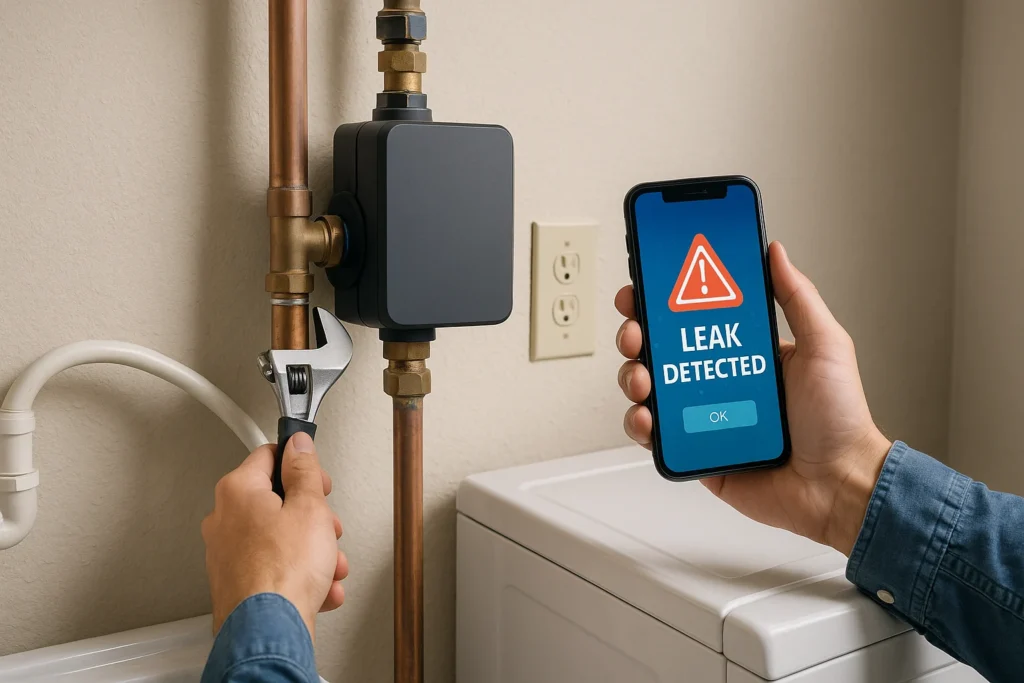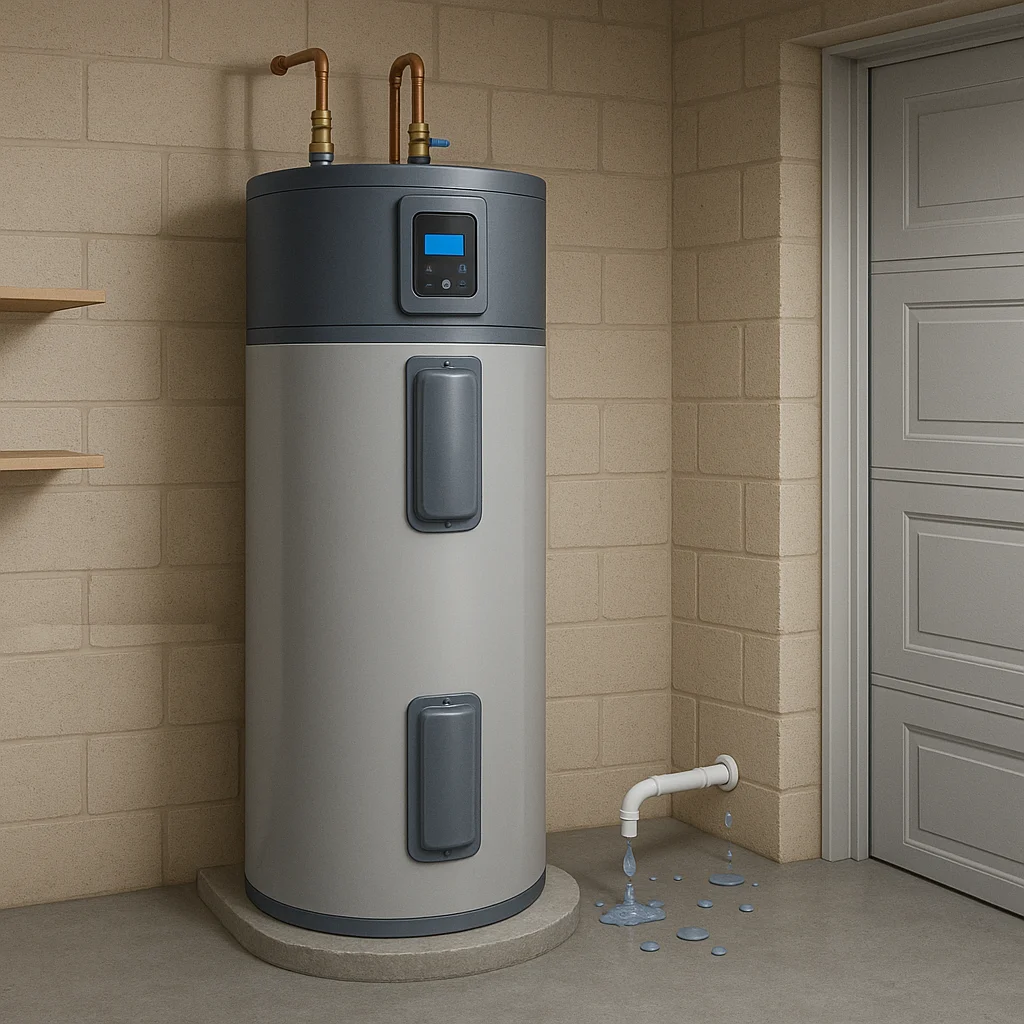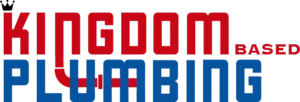If you think plumbing innovation peaked with the invention of the flushing toilet, we’ve got good news: the last decade (and the next few years) are full of genuinely useful advances that make homes quieter, safer, more water-efficient, and easier to maintain. From smart leak shutoffs that text your phone before a drip becomes a disaster to trenchless pipe repairs that save your landscaping, plumbing tech is evolving fast—and a lot of it is perfect for homes and businesses here in St. Johns County, Jacksonville, and St. Augustine.
This guide walks you through the biggest changes, how they help in Northeast Florida’s climate, and practical steps to take now. We’ll close with what’s around the corner so you can plan your upgrades with confidence.
1) The Big Picture: How Plumbing Got Smart (and Why That Matters Here)
A generation ago, “plumbing tech” meant better pipe materials and quieter fixtures. Today, it includes sensors, AI-assisted monitoring, ultra-efficient appliances, and repair methods that avoid excavation. Why it matters locally:
- Storms and water damage risk. In hurricane season, a hidden leak while you’re away can be catastrophic. Smart water monitors can shut off your main line automatically if they detect abnormal flow—huge for second homes and snowbirds. Examples include whole-home systems from Moen Flo and Phyn that analyze pressure and flow to catch pinhole leaks and burst pipes and can close an automatic valve in seconds.
- High groundwater and sandy soils. Traditional dig-and-replace sewer repairs are messy, slow, and disruptive here. Trenchless technologies like cured-in-place pipe (CIPP) and the newer UV-cured liners restore failing lines with minimal digging—often in a day. (Kimley-Horn)
- Water efficiency that doesn’t feel “stingy.” EPA WaterSense has matured into whole-home standards (Version 2.0) and labeled fixtures that save water without sacrificing performance—great for lowering bills and easing strain on municipal systems in fast-growing neighborhoods. (US EPA)
- New energy standards are coming. The Department of Energy finalized updated water-heater efficiency rules in 2024; compliance kicks in May 6, 2029. Translation: heat pump electric water heaters will become the default for many homes, and gas units will also step up efficiency. Planning ahead can save you money and headaches.
2) Smart Leak Detection & Automatic Shutoff: Your 24/7 “Hall Monitor” for Water
What it is: Whole-home monitors sample pressure, flow, and temperature hundreds of times a second. If the system sees continuous flow that doesn’t match normal patterns (say, a burst hose behind your washer at 2 a.m.), it closes a motorized valve and pings you on the app.

Why we recommend it on the First Coast:
- Our storms, power flickers, and seasonal travel increase water-damage risk.
- Many slab-on-grade homes hide supply lines under concrete; small leaks can go unnoticed until they’re big problems.
- Insurance carriers are increasingly friendly to tech that reduces claim risk.
What to look for:
- Automatic shutoff (not just alerts).
- Learning period & fixture typing so the device can distinguish “shower vs. leak.”
- Freeze alerts (yes, we get surprise cold snaps).
- Battery backup or manual override for outages.
Top picks we install/support: Moen Flo and Phyn Plus both offer whole-home monitoring, app control, and auto shutoff. They can detect pinhole leaks and help you spot wasteful habits (drippy hose bibb, anyone?).
How to get started (fast):
- Main shutoff check. If you don’t know where yours is—or it’s corroded—start there.
- Size the valve. Most homes use 3/4″ or 1″, but we’ll verify.
- Wi-Fi strength. We’ll confirm signal at the install location; a small extender may be needed.
- Post-install “learn” period. Expect a week of data before settings are dialed in.
3) Water Heaters: Heat Pumps, Hybrids, and Smarter Controls
The evolution: Tank and tankless are no longer your only choices. Heat pump water heaters (HPWH) are now mainstream, and by 2029 many electric storage models larger than 35 gallons are expected to use heat-pump technology by default under DOE’s final rule. Gas storage water heaters are also stepping up in efficiency.

What’s best for Northeast Florida:
- Heat pump water heaters (HPWH): Fantastic in garages and utility rooms that stay above ~40–45°F. They make hot water while dehumidifying the space—a bonus for humid summers. Expect strong bill savings vs. standard electric.
- High-efficiency gas storage or condensing tankless: Good for homes with existing gas and higher simultaneous demand.
- Smart controls & leak pans: Wi-Fi modules, auto shutoff leak pans, and drain piping to the exterior are small upgrades with big payoff.
Pro tips from our installs:
- Think placement. HPWHs pull heat from ambient air, so garage installs are popular. We’ll check clearances and condensate routing.
- Right-size recovery. Households with back-to-back showers or large soaking tubs may prefer higher recovery rates.
- Future-proof with a dedicated outlet. If you’re all-gas today but may go HPWH later, adding an outlet now can reduce future costs.
4) Trenchless Sewer & Water Line Repairs: Save Your Yard, Save Your Week
The evolution: Instead of digging up your driveway or heritage oak, trenchless methods restore the pipe from the inside. Two standouts:
- CIPP (Cured-In-Place Pipe): A resin-saturated liner is inserted and cured to form a new “pipe within a pipe.”
- UV-CIPP: Newer systems cure liners with UV light for faster installs, consistent curing, and less disruption—especially useful for storm drains and larger diameters.
When trenchless shines locally:
- Root intrusions in older neighborhoods with mature trees.
- Orangeburg or failing clay lines in mid-century homes.
- Cracked cast iron under slabs in older beach properties.
- Driveways, pavers, or new landscaping you don’t want disturbed.
How we decide (step-by-step):
- Camera inspection: Identify breaks, bellies, and offsets.
- Locate & map: Mark depth and path to avoid utilities.
- Hydro-jet & prep: Remove scale/roots to prep for liner.
- Line or spot-repair: Choose full run, sectional repair, or point patch.
- Verify: Post-install video for your records.
Bottom line: You’ll often get a same-day return to service without a construction zone in your front yard.
5) Fixtures & Faucets: Touchless, Ultra-Efficient, and Actually Nice to Use
Where we’ve landed:
- WaterSense-labeled toilets, faucets, and showerheads prove you can save water without a “low-flow” feel. Labeled homes and fixtures undergo performance checks for leaks and flow. (US EPA)
- Touchless and metered faucets moved from airports to homes. Less handle-touching means fewer germs—great for family bathrooms and short-term rentals.
- Smart mixing valves help stabilize temperature and reduce scald risk for kids and seniors.
Local homeowner checklist:
- Replacing a toilet? Choose a WaterSense model with a strong MaP score.
- Shower feeling weak? A modern WaterSense showerhead can improve spray quality with air-injection tech while using less water.
- Kitchen upgrade? Touchless pull-down faucets with robust finish warranties do well in salty air near the coast.
6) Water Quality & Scale Control: Softer Water, Longer Appliance Life
The problem: Hard water and scale shorten the life of water heaters, dishwashers, and ice makers. You’ll see it as cloudy glassware, stiff laundry, and crusty showerheads.
Modern solutions:
- Traditional softeners (ion exchange): Best for maximum scale prevention and soap savings.
- Salt-free conditioners (TAC/Template-Assisted Crystallization): Reduce scale adhesion with no brine, good for folks avoiding salt or where floor drains are tricky.
- Whole-house filtration: Carbon or catalytic media to reduce chlorine, taste/odor, and certain contaminants.
- Point-of-use upgrades: Under-sink filtration or reverse osmosis at the kitchen.
Pro tip: Pair any conditioner with annual service and a post-filter to keep the system effective and sediment out of fixtures.
7) Codes & Compliance: Florida-Specific Updates You Should Know
If you’re pulling permits in 2025, you’re working under the 2023 Florida Building Code – Plumbing (8th Edition), effective January 1, 2024. It integrates changes from the 2021 IPC with Florida amendments. For homeowners, this mainly means safer condensate routing, proper backflow protection, and best practices baked right into the code.
What this means in practice:
- Condensate drains from ACs and heat-pump water heaters must discharge to approved receptors—no creative ties into random plumbing lines. (miamidade.gov)
- Backflow prevention remains essential for irrigation systems and hose bibbs—especially if you’re on reclaimed irrigation or near tidal areas.
- Fixture upgrades often trigger code-compliant installation details (trap primers for floor drains, standpipe heights for washers, etc.). We handle the permit details so you don’t have to.
Coming attraction: The DOE water-heater standards are locked in with a 2029 compliance date. If your electric tank is aging, considering a heat pump unit early can snag rebates and avoid the “everyone’s upgrading at once” rush.
8) What’s New Right Now: Practical Upgrades You’ll Actually Use
Here’s how we’d prioritize upgrades for homes in Jacksonville, St. Johns, and St. Augustine—ordered for impact vs. cost.
- Whole-home smart leak shutoff. One burst line can cost more than the entire system. App alerts and auto shutoff make this our #1 recommendation for primary and vacation homes.
- Heat pump water heater (if electric). Lower bills, dryer garage, quieter operation. Ensure proper condensate routing and dedicated circuit.
- Trenchless sewer rehab (if you have recurring backups). Camera first; line it once, forget the root “roto-roulette.”
- WaterSense fixtures. Toilets and showerheads first for the fastest water savings.
- Scale management. Protect your new heater and fixtures—either softener or TAC conditioner based on your goals.
9) What’s Next: The Near-Future of Plumbing (2025–2030)
You don’t need a crystal ball—just follow the standards, manufacturers, and municipal projects. Here’s where we see momentum:
- Predictive plumbing via AI. Today’s leak detectors already build usage profiles. Next up: systems that forecast failures by correlating tiny pressure anomalies with pipe age, water chemistry, and past events—and proactively schedule service. (We’re already seeing the early steps in 2025 trend reports around IoT + predictive maintenance.)
- Utility-integrated water monitoring. Expect more programs where your smart monitor can share anonymized leak alerts with utilities for faster mainline break responses and possible bill credits in drought or conservation pushes.
- UV-CIPP growth for rehab. As municipalities complete big UV-cured lining projects, costs trend down and contractor capacity increases—good for neighborhoods with older storm and sewer infrastructure.
- Heat pump dominance for electric water heating. With the 2029 standards, expect better cold-climate performance, quieter compressors, and more form factors for tight spaces.
- Greywater and reuse friendliness. Florida already embraces reclaimed “purple pipe” irrigation in many communities; look for friendlier residential rules and packaged systems that make laundry-to-landscape recycling simpler (especially in new construction).
- Legionella-aware design for multi-family and commercial. Smarter recirculation, temperature controls, and remote monitoring will become standard in larger buildings.
10) A Homeowner’s How-To: Upgrade Pathways Based on Your Situation
A) You’ve had one water-damage scare (or rent out a short-term rental):
- Install a whole-home smart shutoff.
- Add braided stainless supply lines at all fixtures.
- Mount water-sensing pads under the water heater, fridge, and sinks.
B) Your water heater is 8–12 years old:
- If electric: price out a heat pump unit now. Check clearances, condensate drain routing, and noise preferences.
- If gas: compare high-efficiency storage vs. condensing tankless.
- Add a leak pan with a drain line and a smart sensor.
- Consider a pre-emptive anode rod replacement if you’re keeping the existing tank a bit longer.
C) Recurring slow drains or sewer smells:
- Book a camera inspection.
- If roots/offsets found: compare spot repairs vs. full-run lining.
- Install a proper cleanout if you don’t have one.
D) Scale or water-quality complaints:
- Test hardness and chlorine.
- Decide on softener vs. TAC and whether you want whole-house filtration.
- Replace aerators and clean showerheads; set a 6-month reminder to descale.
E) Remodeling a bathroom or kitchen:
- Use the remodel to bring everything to current code, especially venting and trap configurations.
- Choose WaterSense fixtures and a quiet, efficient disposal.
- Add shutoff valves that are easy to reach and label them.
11) Business & Property Manager Corner: What’s Worth It?
- Smart shutoffs on multi-tenant risers reduce flood claims—and tenant drama.
- Remote meter/submeter dashboards catch leaks in vacant units.
- Camera inspection + as-built map after turnover prevents “mystery line” surprises.
- Annual water heater check (flush, anode inspection, T&P valve test) extends life and keeps you ahead of the 2029 efficiency transition.
- Storm readiness: Backflow devices, vacuum breakers, and properly anchored gas water heaters help you pass post-storm inspections quickly under Florida’s current code. (ICC Digital Codes)
12) Budget Planning: What Costs What (Typical Ranges)
Every house is different, but here’s how we help customers in Jacksonville and St. Johns think about budgets:
- Whole-home smart shutoff: The devices themselves are a few hundred dollars; installed pricing depends on valve size, access, and electrical/Wi-Fi adjustments. (We’ll quote after a quick site check.)
- Heat pump water heater: More upfront than a standard electric tank, but lower operating costs. We help you navigate local rebates and plan condensate routing in advance of the 2029 standards.
- Trenchless lining: Often competitive with dig-and-replace when you factor in site restoration. A camera survey is the first step.
- WaterSense fixture swaps: Toilets and showerheads offer quick savings; we’ll price by model and handle haul-away and disposal.
Ask us for a written estimate with good-better-best options. We’ll show you the lifetime cost differences (water + energy + maintenance) so the math is transparent.
13) Maintenance Moves That Stretch the Life of Your System
- Annual water heater service: Flush sediment, test T&P, check anode.
- Clean aerators and showerheads every 6–12 months to prevent clogging and spray distortion.
- Replace rubber supply lines (toilet, washer) with braided stainless.
- Exercise shutoff valves twice a year so they don’t seize when you actually need them.
- Smart monitor “health check.” If we installed a leak system, we’ll run a test to confirm valve action, app connectivity, and alert logic.
Frequently Asked “Is It Worth It?” Questions
Do smart leak systems really prevent damage?
Yes—by shutting off the line automatically when abnormal flow is detected. We’ve seen systems prevent entire-home floods from a burst ice maker line while owners were out of town.
Are heat pump water heaters loud or “cold down” the room?
They sound like a small dehumidifier and gently cool/dehumidify the space they’re in—perfect for a muggy garage. Plan placement and condensate routing and you’ll love them. The 2029 standards will only accelerate improvements.
Is trenchless lining as durable as new pipe?
Properly specified and installed CIPP—and especially UV-cured liners—create a structural “pipe within a pipe” with excellent longevity, verified by municipalities and large rehab projects nationwide.
Do WaterSense fixtures feel weak?
Not anymore. Modern engineering gives you strong spray patterns, better bowl rinsing, and lower water bills. Look for WaterSense labels and solid performance data.
A Local Plan for the Next 5 Years
If you want a simple, staged roadmap for a Northeast Florida home:
Year 1–2
- Install a smart leak shutoff.
- Replace the worst offenders: old toilets and leaky shower valves.
- Camera your sewer if you’ve had repeats of slow drains.
Year 2–3
- If electric, move to a heat pump water heater (or plan for it with outlet and condensate).
- Add scale control to protect appliances.
- Repipe problem branches in PEX or copper (case-by-case).
Year 3–5
- Tackle any trenchless sewer rehab to future-proof the line.
- Convert more fixtures to WaterSense and add touchless where it makes sense.
- If you own rentals, standardize on shutoffs, sensors, and a quick inspection checklist between guests/tenants.
Ready to Upgrade? Here’s How We Help
Kingdom Based Plumbing is a family-run team serving St. John’s County, Jacksonville, St. Augustine, and nearby communities. We live here, we know the soil and the codebook, and we’re happy to walk your home or property with you to pick upgrades that actually fit your lifestyle and budget.
- Consult & camera: We start with a fast survey and—if drains are suspect—a video inspection you can keep.
- Good-Better-Best options: Clear pricing with lifecycle savings explained.
- Permits & compliance: We handle Florida code details, including the 2023 FBC Plumbing requirements now in force.
- White-glove installs: From clean drop cloths to app setup on your phone, we’re with you end-to-end.
- Maintenance plans: Annual checks for heaters, shutoffs, and filtration keep everything humming.
Quick Recap: What’s New and What’s Next
- Now: Smart leak shutoffs, heat pump water heaters, trenchless lining, and WaterSense fixtures deliver immediate, real-world value.
- Next: AI-assisted predictive maintenance, more UV-CIPP adoption, and the 2029 water-heater standards will raise the bar on efficiency and reliability
If you’d like help prioritizing upgrades for your home or business, we’ll come out, assess, and map a plan that makes sense for Northeast Florida living. Give us a call—we’re right around the corner.



